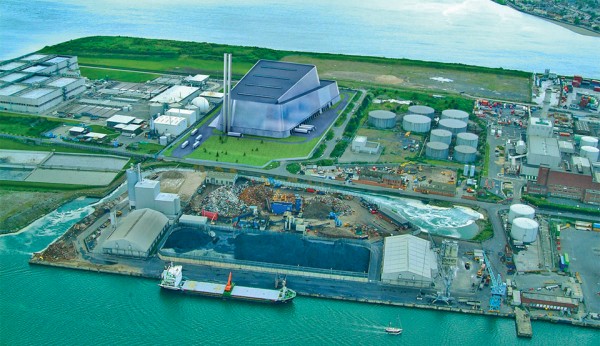
An artist’s impression of the incinerator, top centre.
In what is reflective of the 17-year process, the controversy regarding the Poolbeg Incinerator continued recently. On Friday 19th September, without notifying Dublin City councillors, the DCC Chief Executive, Owen Keegan, signed the 45-year binding contract with the other Dublin Local Authority CEOs, giving the ultimate go-ahead for the building and operating of Poolbeg Incinerator by American company, Covanta.
Despite being objected to on a range of issues by concerned citizens across Dublin and Ireland on numerous occasions, as well as continuous votes against the proposal by Dublin City councillors, the project is to proceed on a three-year build timeline and begin operating by 2017 on a 45-year contract.
Most recently, Dublin City councillors voted 52–2 against the project, reiterating their concerns regarding environment, suitability, sustainability, cost overruns, and democracy. To prevent sunk costs of over €100m for the four Dublin local authorities due to mismanagement, the contracts for the go-ahead were signed within 11 days in a clandestine manner, echoing the anti-democratic manner of the 17-year process.
Councillors are now powerless to stop the DCC Chief Executive due to the change brought into law by Fianna Fáil through the amendment of the Waste Management Act in 2001. Decision-making power regarding waste disposal was placed solely in the hands of the executive arm of the council, effectively killing the mechanism of local democracy that could have prevented the building of an incinerator in the heart of Dublin Bay.
A range of concerns hang over the project that have not been fully answered and could present serious ongoing problems for the local community and the Dublin population in general.
Throughout the whole process it has become apparent that no State agency has outright responsibility for human health effects. Dr Anthony Staines, Professor of Epidemiology, DCU, has been trying to highlight this for many years. He states that “this is a reckless decision by the Dublin City Council CEO and we are going to pay for it.” Dr Staines emphasised huge concerns over the health implications of a mega incinerator such as Poolbeg. He estimates that the traffic increase alone will result in “people with heart disease dying early.”
Although the health impacts of such an incinerator are supposedly examined by the Environmental Protection Agency, there are concerns that this may not be adequate coverage due to lack of health monitoring data.
Dr Staines has previously reported, in an assessment of the effectiveness on the Environmental Impact Statement, that “the proposed development in my professional opinion requires a proper HIA to ensure reasonable consideration of human health issues in the planning and licensing processes. The material provided in the EIS falls far short of any reasonable estimate of what is required. The people of Dublin and the local community deserve better.”
However, these concerns may be dwarfed by other health concerns that may not have been examined thoroughly in the planning process. Incinerators are known to result in dioxin production and the creation of Particulate Matter (PM) from the fly-ash left over after incineration. PM can be so small that it can enter the human body through the lungs, bypassing normal human defence systems.
Research done in 2004 by the WHO European Centre for Environment and Health, Bonn found that PM increases the risk of respiratory death in infants under one year, affects the rate of lung function development, aggravates asthma and causes other respiratory symptoms such as cough and bronchitis in children. PM2.5 seriously affects health, increasing deaths from cardiovascular and respiratory diseases and lung cancer.
Increased PM2.5 concentrations increase the risk of emergency hospital admissions for cardiovascular and respiratory causes; and PM10 affects respiratory morbidity, as indicated by hospital admissions for respiratory illness.
Several of the metals found in the emissions and ash produced by incinerators are known or suspected carcinogens, and also implicated in autism, dyslexia, allergies, impulsive behaviour attention deficit and hyperactivity disorder (ADHD) as well as learning difficulties, depression, dementia and Parkinson’s Disease.
Although the EU Industrial Emissions Directive of 2011 covers standards for incinerator plants, the Irish Doctors Environmental Association notes that “little is known about the risks of many of these toxic chemicals, particularly when they are combined [through emissions].” Notably, this Directive also comes after the EPA licence was granted in 2008.
Of particular interest is that a cleaner waste processing technology without these health issues now exists. The autoclaving and pyrolysis procedures of an Irish company, Vaporo Tech, offer a cleaner, healthier, and cheaper method than the mega incinerator of Covanta. Were the Poolbeg project not being pursued determinedly by Owen Keegan, “a safer alternative could be built within 12 months on a greenfield site for about €40m,” states David Walsh of Vaporo Tech.
This compares to the €500m that Covanta are spending on Poolbeg. However, attempts to demonstrate this option to the DCC Chief Executive have been met by deflection and non-interest. Should revenues fall below targets, DCC and the other local authorities are also contracted to loss sharing with Covanta.
There are also major concerns regarding the planning process for the incinerator. Recently in the Dail it was highlighted that Conall Boland, who is Deputy Chairperson of An Bord Pleánala, and has been on the Board since 2007, previously worked for RPS, the consultancy firm advising the council on proceeding with the Poolbeg Incinerator.
Former DCC Chief Executive John Tierney, who ran up many of the costs – nearing €100m to date – has moved to the position of Irish Water CEO, and has since hired two former RPS employees.
Although the contracts have been signed for the incinerator, it remains open whether local groups may launch a legal challenge, and it has been indicated to NewsFour that this may be announced in the near future.
Regular updates on this issue will be posted on newsfour.ie as well as a series documenting the main issues of the Poolbeg Incinerator.
By Ferg Hayden

